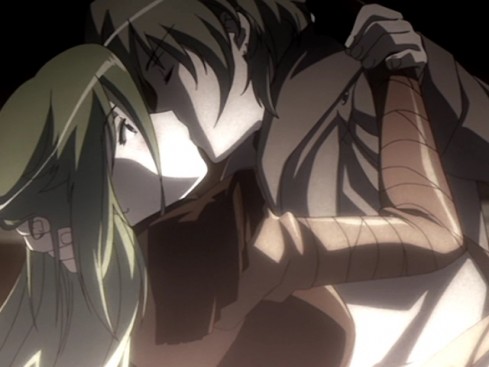
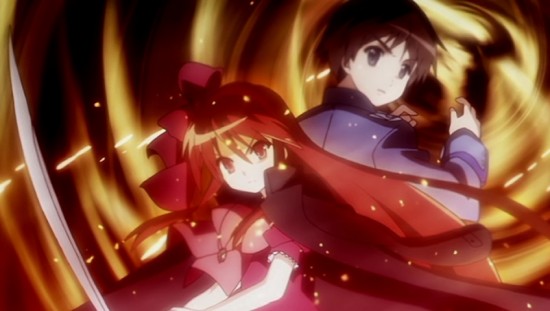
Way back during the Age of the Dinosaurs when I first decided to try writing an anime review I chose the original Geneon DVD release of the first season of Shakugan no Shana. These days, with streaming video typically available on the day of the original broadcast, I don’t watch too many anime DVDs. However I recently got hold of BD set for the second season of Shana and decided to write an old-fashioned review of it.
-
TitleShakugan no Shana Season II
-
Original TitleShakugan no Shana Sekondo (Shana of the Blazing Eyes–Second)
-
DemographicSeinen
-
GenresFantasy, Horror, Adventure, Romance
-
Based onA series of light novels by Yashichirou Takahashi
-
DirectorTakashi Watanabe
-
Series CompositionYasuko Kobayashi
-
MusicKou Ootani
-
Original Character DesignNoizi Itou
-
Character DesignMai Otsuka
-
Art DirectorYoshinori Hirose
-
Chief Animation DirectorMai Otsuka
-
StudioJ. C. Staff
-
Contents24 episodes on 4 DVDs/BDs
-
LaguagesJapanese with subtitles; English dub
-
North American Publisher
General Impressions
Unfortunately this is the weakest of the show’s three seasons. The first half feels particularly weak. It seems slow-moving and directionless. Things pick up quite a bit in the second half, building up to a rousing though somewhat confusing conclusion.
Rewatching it now, after having seen the third season, I find that I like the second season more than I did at first. The events of the second season lay the groundwork for what the characters do in the third. Still, a better writer might have handled the character development without letting the story drift.
The first season started with Yuuji, a weak protagonist but decent and likeable, and Shana who was powerful but cold and unlikeable. By the beginning of the third season Yuuji has become much more powerful but cold and distant, while Shana has become the sympathetic protagonist we cheer for. The second season occupies a less satisfactory middle ground. Shana tries sincerely but clumsily to become more human while Yuuji wonders whether humanity is a luxury that he can no longer afford.
I don’t recommend that anyone watch the second season by itself. However if you enjoyed the first season and want to watch the third (which is the best of the three) then you need to watch the second season because the third depends on it.
Parental Advisory
The second season doesn’t seem quite as dark as the first but there is still plenty of violence. It is fanciful violence but that probably wouldn’t make much difference to a young child. I would only feel comfortable recommending this for teenagers and up.
Translation Notes
The main problem for any translator is the poetic language, especially the strange but expressive Crimson World titles. In Japanese traditional poetic language tends to be concise, using enigmatic phrases with short words derived from Chinese. In English poetic language tends to be verbose, with ornate phrases and long words derived from Latin.
Thus an attempt to accurately translate the titles will cause most of them them to explode, making them too long to fit in the subtitles, let alone for the English voice actors to say. The only thing I can recommend is to watch this with subtitles so that you can at least hear some of the poetry in the original Japanese soundtrack.
At least the Season 2 translation does not call Wilhelmina Carmel “Wirhelmina,” as Geneon did on the Season 1 DVDs. This illustrates a good general rule: it’s all very well to consult with native Japanese speakers when deciding how something should be translated, but a native English speaker should make the final decision.
DVD/BD Extras
Once again the Extras menu includes a series of “Naze Nani Shana” omake episodes in which chibi versions of Friagne and Marianne explain the underlying assumptions and backstory of the fantasy world. These are both entertaining and helpful.
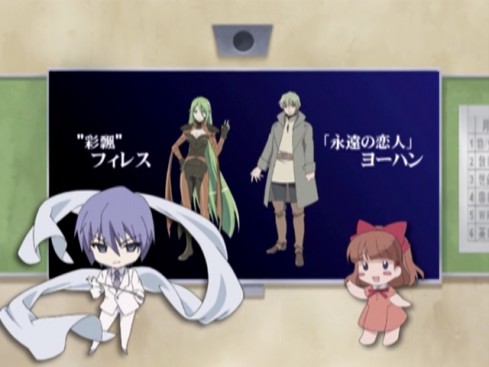
On the other hand the “Shana-tan” omake episodes fall flat. During the first season it was pretty funny to see a miniature Shana berating and abusing Yuuji, since that wasn’t too far from her actual behavior. However in the second season, when she is clearly working hard to conform her behavior to human norms, this just seems unfunny and unfair.
Even more misguided are a couple of episodes with alternate soundtracks with commentary by the American voice actors. A commentary by the Japanese director might be enlightening but the American VAs are too far removed from the source material to provide any useful insights.
New Concepts
Another idea with a totally arbitrary English name: An Outlaw is a meeting place where Flame Hazes and their human friends can get together to trade information and form working alliances. Such places exist in most of the world’s major cities. They are all loosely affiliated and in times of crisis they can put together a substantial fighting force.
New Characters
 Mare the Village of Playful Sleep is a relatively weak Crimson Denizen, but she has the potentially dangerous ability to put humans in a dream state in which they relive past events.
Mare the Village of Playful Sleep is a relatively weak Crimson Denizen, but she has the potentially dangerous ability to put humans in a dream state in which they relive past events.
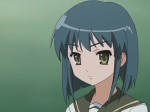 Fumina Konoe is a new transfer student who somehow looks just like Hecate the Supreme Throne. However Shana should be able to tell the difference between a Denizan and a human, and Fumina certainly seems human. She’s a very annoying human though, a spoiled rich girl incapable of doing even the simplest things for herself.
Fumina Konoe is a new transfer student who somehow looks just like Hecate the Supreme Throne. However Shana should be able to tell the difference between a Denizan and a human, and Fumina certainly seems human. She’s a very annoying human though, a spoiled rich girl incapable of doing even the simplest things for herself.
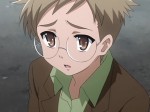 Yuri Chvojka the Summoner of the Power of the Mountain Spirits, the Flame Haze of Valac, was an idealistic young recruit to the cause. Margery thought he lacked the necessary toughness.
Yuri Chvojka the Summoner of the Power of the Mountain Spirits, the Flame Haze of Valac, was an idealistic young recruit to the cause. Margery thought he lacked the necessary toughness.
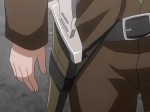 Valac the Poisonous Lizard Commander (Crimson Lord) speaks through a short sword. She sounds like a world-weary woman.
Valac the Poisonous Lizard Commander (Crimson Lord) speaks through a short sword. She sounds like a world-weary woman.
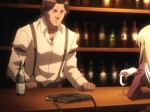 East Edge the Milky Way Summoner, the Flame Haze of Quetzalcóatl, is a tall laconic Native American who tends bar at the Outlaw in New York City. He has a very minor role in the second season but is a major character in the third, so I will have more to say about him when I get around to reviewing that.
East Edge the Milky Way Summoner, the Flame Haze of Quetzalcóatl, is a tall laconic Native American who tends bar at the Outlaw in New York City. He has a very minor role in the second season but is a major character in the third, so I will have more to say about him when I get around to reviewing that.
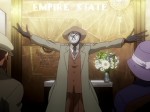 Annaberg the Cavern that Pierces to the Core (Crimson Denizen) plotted to speed up human technological advancement by starting a major war.
Annaberg the Cavern that Pierces to the Core (Crimson Denizen) plotted to speed up human technological advancement by starting a major war.
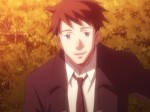 Kantarou Sakai is Yuuji’s father who has been working overseas since before the start of the first season. He chooses this time to come home. He is a calm, confident man with an impish sense of humor. His bond with Chigusa is obviously very strong.
Kantarou Sakai is Yuuji’s father who has been working overseas since before the start of the first season. He chooses this time to come home. He is a calm, confident man with an impish sense of humor. His bond with Chigusa is obviously very strong.
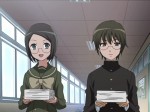 Harumi Fujita serves along with Hayato Ike as Class Representative. She obviously likes him but he considers her much too bossy.
Harumi Fujita serves along with Hayato Ike as Class Representative. She obviously likes him but he considers her much too bossy.
 Fecor the Mountain Storm Hoof looks like a conventional bat-winged demon in a business suit. He has a mournful countenance and a pessimistic manner but he should not be underestimated. He is one of the Bal Masqué’s most powerful fighters. He acts as gatekeeper of the Seireiden and is in charge of its defenses.
Fecor the Mountain Storm Hoof looks like a conventional bat-winged demon in a business suit. He has a mournful countenance and a pessimistic manner but he should not be underestimated. He is one of the Bal Masqué’s most powerful fighters. He acts as gatekeeper of the Seireiden and is in charge of its defenses.
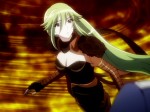 Pheles the Colorful Wave is a powerful Denizen Lord who stopped devouring humans after falling in love with one.
Pheles the Colorful Wave is a powerful Denizen Lord who stopped devouring humans after falling in love with one.
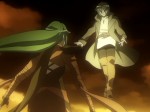 Johan the Eternal Lover was a human boy raised by Pheles. After he grew up they fell in love and he became an accomplished wizard. In order to remain with her he created the Reiji Maigo (Midnight Lost Child) and became a Mystes.
Johan the Eternal Lover was a human boy raised by Pheles. After he grew up they fell in love and he became an accomplished wizard. In order to remain with her he created the Reiji Maigo (Midnight Lost Child) and became a Mystes.
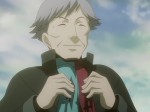 Zarovee the Fourth Rank of Apportionment is a very weak Denizen with a timid and unctuous manner. He has the ability to split off 4 copies of himself.
Zarovee the Fourth Rank of Apportionment is a very weak Denizen with a timid and unctuous manner. He has the ability to split off 4 copies of himself.
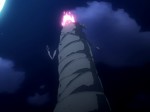 Bifrons the Howling Maw is a Denizen who resembles a giant cannon. He can move stealthily and attack with a devastating blast.
Bifrons the Howling Maw is a Denizen who resembles a giant cannon. He can move stealthily and attack with a devastating blast.
 Sabrac the Destroying Blade is the most frightening villain since Friagne. A cold-blooded assassin, he hides and strikes without warning with overwhelming force. His sword leaves wounds that defy the self-healing powers of a Flame Haze, growing ever wider and deeper. Sometimes he attacks riding a tsunami of flame.
Sabrac the Destroying Blade is the most frightening villain since Friagne. A cold-blooded assassin, he hides and strikes without warning with overwhelming force. His sword leaves wounds that defy the self-healing powers of a Flame Haze, growing ever wider and deeper. Sometimes he attacks riding a tsunami of flame.
Other Random Observations
I interpret it this way: one of the main questions of the story is what kind of relationship Yuuji and Shana will have. In the first season they encounter bad role models; in the second season they encounter better role models; in the third season they get to choose for themselves.
Another theme that appears repeatedly in the second season is that various people are not what they appear to be. I’m not sure if this has any overall significance. Perhaps the point is that Yuuji and Shana, and for that matter Kazumi and Eita, still have to figure out who they really are.
Links
My original review of the first season.


